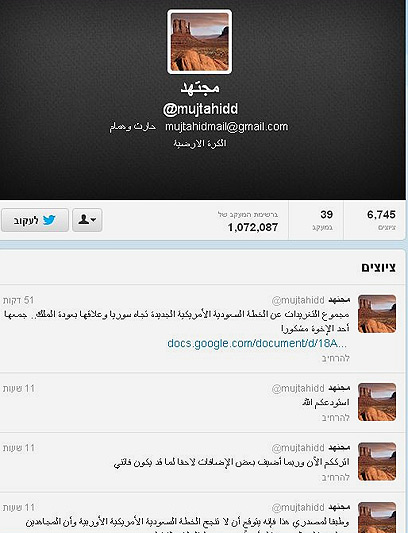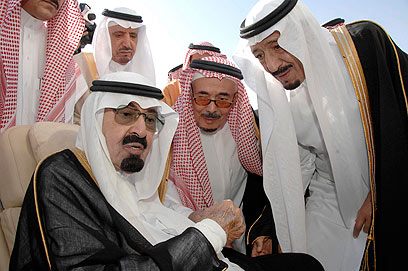More than three million users (some 12% of the kingdom's population) are now connected to Twitter, and they make no less than 1.5 million tweets per day.
Related Stories:
- Judge: Twitter must identify anti-Semites
- PM Erdogan says social media 'danger to society'
- Op-ed: Governing without criticism
These figures are not solely statistics: they remind us once again of the new and real challenge facing the regimes of tyrants and royal families. While the streets do not allow any statements against the leaders, Twitter's bird and aliases permit everything.
That is exactly what is happening in Saudi Arabia lately, where despite the lack of freedom of expression and rough trampling of human rights (and especially women's rights) in it, it has finally found a place to truly express everything.

Mujhatid's twitter page
Since the arrival of the Twittersphere to Saudi life, every controversial issue in the kingdom makes its way to the virtual world. Suddenly, the Saudis are not hesitant with their words to express their fierce criticism.
One of the most prominent figures in the Saudi Twittersphere is an anonymous user named Mujtahid. More than a year ago he opened an account that is today followed by more than one million users. He took it upon himself to expose the sins and corruption of the Saudi royal family and government. He reported several times about the ousting of senior officials due to corruption and the princes' extravagant shopping sprees.
It is unclear who is behind this account, but it seems it is someone closely related to powerful entities in the kingdom. A human rights attorney in Jeddah said in regards to Mujtahid that "the authorities could have tracked him and arrested him, but they know the response to that would be very severe and that people may even take to the streets."

Saudi King, not immune to criticism (Photo: AP)
Interestingly, Twitter also attracts users from more distant parts of the kingdom, and not only from the capital Riyadh or Jeddah. "The Saudis see Twitter as their real parliament," a Saudi citizen explained to Ynet. "On Twitter, the Saudis express their opinions freely, with no harsh censorship."
The Saudis' strong will to talk through Twitter about what is forbidden, indicates that even though the Saudi King Abdallah bin Abd al-Aziz al-Saud remained stable following the Arab Spring, the reality is completely different.
"There should be no mistakes. A protest like this is unprecedented," said a local Saudi journalist, "the royal family's corruption, women who mock religion, discussion about hot topics and the Shiite minority are all on Twitter, and not on the streets."
According to different reports, Saudi Arabia is considering blocking WhatsApp and Viber, two very popular applications on Saudi smartphones, but has probably given up on blocking Twitter. The Jedda lawyer said: "It is simply too late to try and stop it. If they block Twitter, people will find new ways to speak up. Either way, the fear barrier has been crossed."
- Receive Ynetnews updates
directly to your desktop















